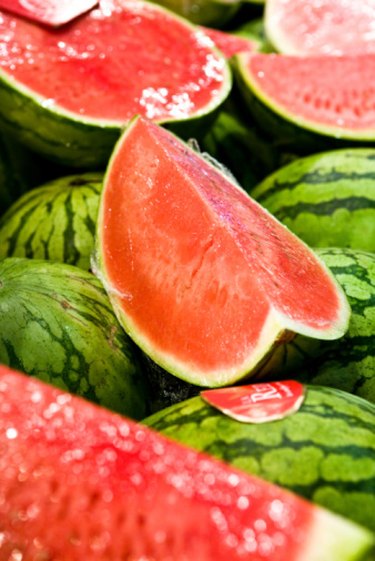
Watermelons are warm-season fruits that enjoy lots of moisture and particular nutrients. Although watermelons require certain amounts of potassium or potash and phosphorous when they're first beginning to grow, they generally need extra doses of only nitrogen as they're maturing and producing fruits. Pay careful attention to the type and amount of fertilizer that you apply to your watermelon plants because they can greatly affect your crop.
Planting
Video of the Day
Make the first fertilizer application for growing watermelons before you even plant them. When you prepare the soil bed for planting, apply a 5-10-10 NPK fertilizer at a rate of 30 lbs. per 1,000 square feet of bed. If you're going to use black plastic mulch, apply about 1 lb. of actual nitrogen, 2 lbs. of phosphorous and 3 lbs. of potash per 1,000 square feet, or use an NPK formula with a ratio of 1-2-3.
Video of the Day
Types
Because watermelons can grow well in soils with a pH range of 5.0 to 6.8, you don't need to apply large amounts of lime or other amendments to drastically adjust the soil pH. Instead, make one or two side dressing applications of ammonium nitrate or calcium nitrate. These applications should occur before the vines begin to "run" and again right after bloom, when the watermelons are beginning to develop on the vines.
Dosage
The correct dosages for each of these side dressing applications will depend on the type of fertilizer you use. If you apply ammonium nitrate, use 1 lb. of fertilizer per 100 feet of row. If you use calcium nitrate, apply 2 lbs. per 100 feet of row. Side dressing applications involve spreading the fertilizer along the sides of the rows instead of applying the fertilizer directly around the plants. Don't overfertilize the watermelon plants with too much nitrogen, because doing so will promote excessive vine growth and reduce your watermelon yield.
Other Care
In addition to fertilizing, water your plants generously. Watermelons require nearly constant moisture, especially when the fruits are forming. In the absence of rainfall, provide supplemental watering to keep the soil evenly moistened at all times. When you water, ensure that you moisten the soil thoroughly to a depth of 6 inches or more. If you use sprinklers or other types of overhead irrigation methods that wet the foliage, water only in the morning so that the foliage can dry before nighttime. Drip irrigation and similar watering methods that deliver water directly to the soil are much better options because they don't wet the foliage and increase the risks for fungal diseases on the watermelon plants.